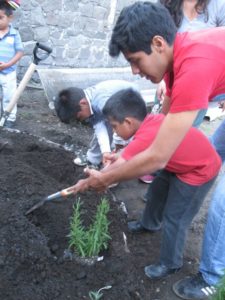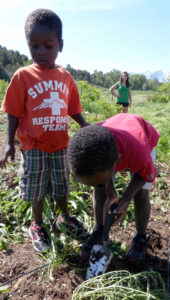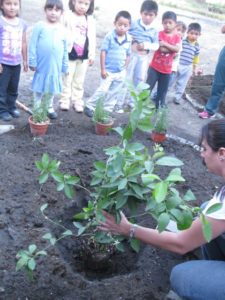Read Illène Pevec’s new book,
Growing a life: Teen Gardeners Harvest Food, Joy, and Life!
You can also follow it on Facebook.

A Child’s Garden of Peace is a collaborative effort founded and directed by Dr. Illène Pevec to create gardens where children can play in peace and learn to grow food for themselves and their families. ACGP acts always in collaboration with other educational entities and foundations. This is the story of how it began and how it operates.
In 1998 when I turned 50 and was starting graduate school I attended a workshop on wisdom facilitated by Dr. Reynold Feldman at the Society for Values in Higher Education. I met there Dr. Anna Washecha who told me about Farm in the City, a project in St. Paul, MN that brought children into a garden setting to do fine arts, horticulture and cooking. I realized that creating gardens with children was exactly what I needed to do in graduate school. I began by co-creating a children’s garden at Grandview Elementary School in inner city Vancouver with a landscape architecture student, Tracy Penner, as part of my graduate studies. Thanks to that work I got a grant from the Canadian International Development Agency to do a garden with children in partnership with an educational group called CELUAN in Santo Angelo, Rio Grande do Sul, Brazil. (I am a Brazilian by birth and had always wanted to return to Brazil to work with children.) CELUAN included three Subud members, and I worked with them in a very poor neighborhood and with the Centro Sul neighborhood where we put in a garden at the elementary school and community center with children as our students and co-gardeners. The project continued through January of 2012 and incorporated film making thanks to Myra Margolin and photography as well many other creative activities into the program with youth ages 2 to 19. We ran summer camps for several years and took 38 youth to Brazil’s national park at Iguassu Falls.
We developed a women’s enterprise making purses from re-used aluminum pull tabs and scholarships for women’s education resulting in one mother graduating from high school, another from a pharmacy assistant program and one young woman getting a teaching degree. All of these women earned their scholarships by working with the children in the community center garden.
A Child’s Garden of Peace also continues to work in São Borja , Rio Grande do Sul, Brazil with the Centro De Formação Theresa Verzeri , a center dedicated to educating the lower economic groups, most particularly children and youth. Nuns and a secular staff run a diverse educational program in the half day that children do not attend school so they have one group of about 110 children ages 5 to 15 in the mornings and another in the afternoons. Beginning in 2006 we helped them to incorporate gardening and environmental education into their program and they have won a national prize from the Itaú bank, 200,000 reais (about $100,000) for running the best children’s environmental education program in Brazil. This allowed the program to buy a school bus and put up a greenhouse. The children teach gardening now to adults in their home neighborhoods.
In Rio, I collaborated with the longest running non-profit day care center in Rocinha, Brazil’s largest favela. We put the garden on the ASPA day care roof because there was no ground space and the roof is the safest place for the children away from gun battles between police and drug runners. They serve 120 children daily from birth to 10. We helped to provide funding for a new nursery for infants on the top floor as well.
In Colorado I have helped to start gardens at elementary and high schools. I am currently working with Fat City Farmers, www.fatcityfarmers.org, a Western Colorado non profit that focuses on agricultural education and creating sustainable food systems. As the program director I run workshops for teachers to help them to integrate food growing into meeting educational goals for their students. I have worked with the Roaring Fork High School garden along with the Central Rocky Mountain Permaculture Institute since 2009. This year, 2014, we are working with the Environmental Sciences class to establish a school wide composting program for all organic trash including paper and lunchroom waste. We are working with the Carbondale Growers guild to fully develop the Forest Garden in the school orchard.
The garden project (el huerto) in Puebla is a collaboration with the Fundacion BP Casa Cuna Palafox y Mendoza, a child care center serving poor families with children ages birth to 5 and Subud Puebla, the Guerrand Hermes Foundation for Peace, SDUSA, Susila Dharma International, and the World Subud Association to establish a garden for education activities and to provide fresh vegetables and fruit to the children. This garden involves many high school and college youth as well. They do their community volunteer service by helping at Casa Cuna. We are composting food waste from the kitchen, planting vegetable gardens, herbs and fruit trees to give the children the chance to engage with the natural life cycle at their day care program and to eat the food they grow themselves. A big part of our work is training the many volunteers who give their time to the children at Casa Cuna in how to use the garden to encourage children’s exploration and inquiry into the natural environment.



